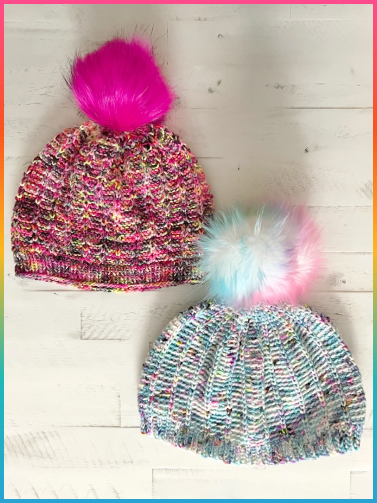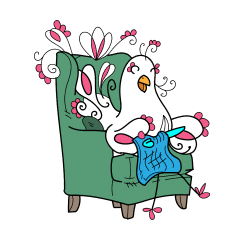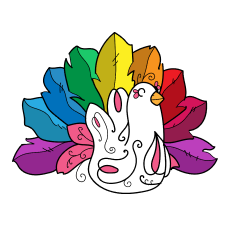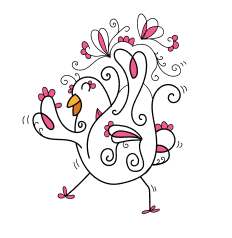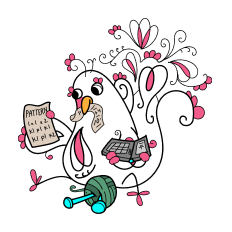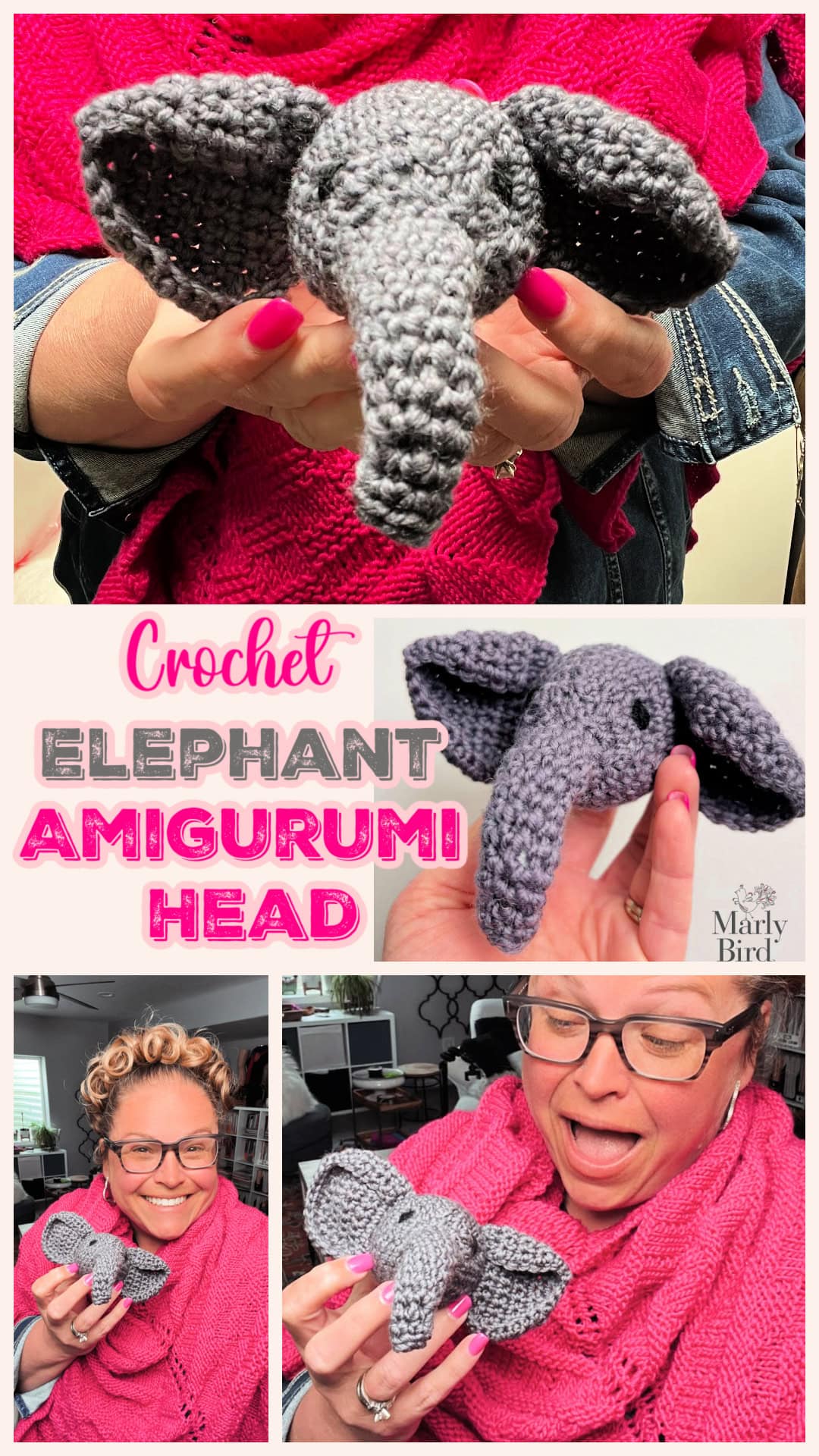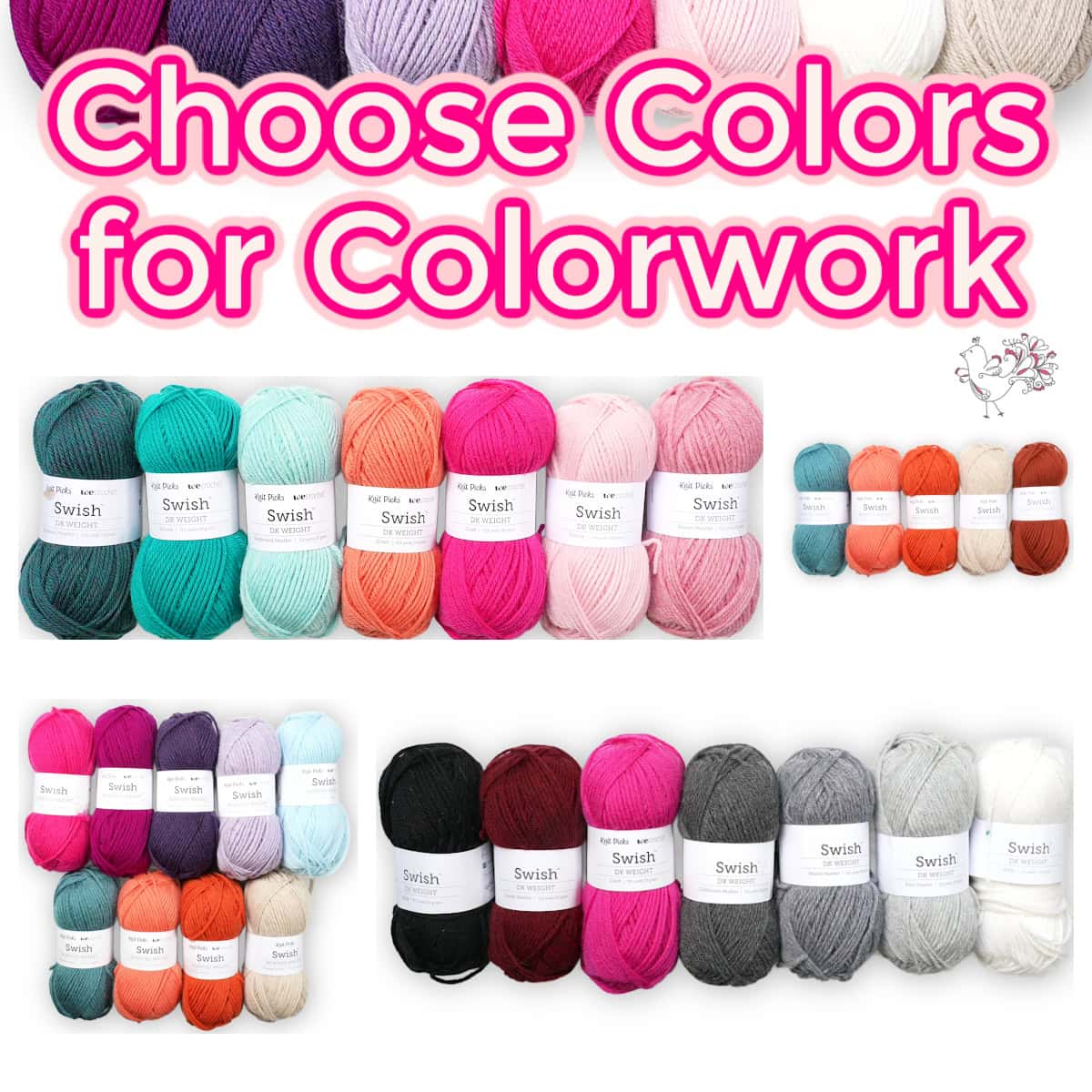Prism Path Knit Swoncho | Part 4 | Prism Make-Along 2025 Free Pattern
Welcome back to the Prism Make-Along with Marly Bird! You’re already halfway through your swoncho yoke, and today we’re moving into Charts 3 and 4 of your stranded colorwork adventure. This section continues to build the rhythm of the yoke and introduces new motifs that bring even more life and motion to your garment.
Let’s keep those stitches flying—and make sure we’re setting ourselves up for a great fit!
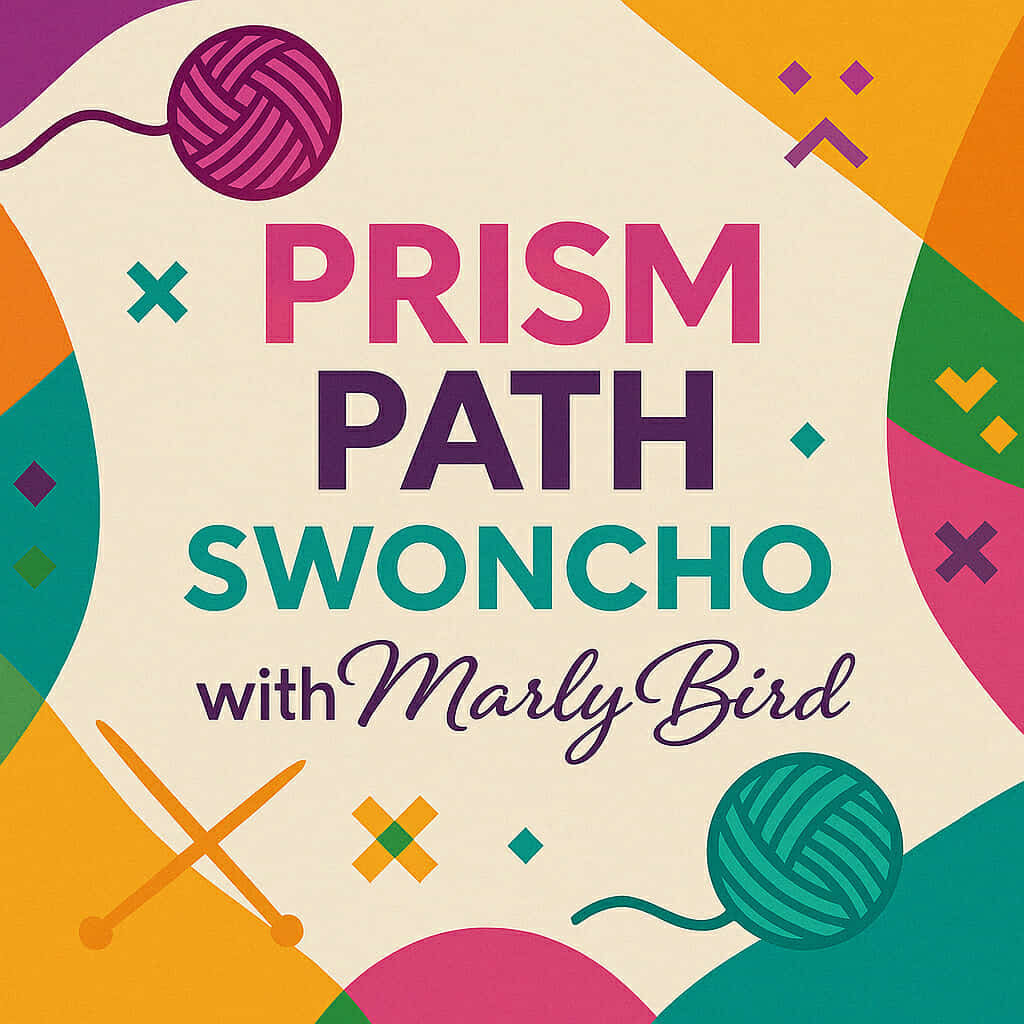
Affiliate Disclosure: This post contains affiliate links. If you click on one of these links and make a purchase, I may earn a small commission at no additional cost to you. This helps support the content and free patterns I provide here on MarlyBird.com. Thank you for your support—it means the world to me! 💖
🎨 Charts 3 & 4 – Bold Colorwork Continues
This week, you’ll be working through two more full colorwork charts, continuing to shape the top of your swoncho while layering in fresh colors and movement.
Here’s what to keep in mind as you move into Charts 3 and 4:
- You’ll continue using your larger needles for the colorwork
- When 3 colors are used in one row maintain consistent floats (see tips from chart 2 video)
- Kfb (knit front and back) increases will appear between charts
- The main color continues to act as a visual bridge between motifs, tying your yoke together
💡 Don’t forget to check your stitch count as you go!
📏 Stay Consistent with Your Gauge
Stranded colorwork has a way of shifting your tension—especially if your float spans get longer. At this stage in the pattern, it’s crucial to:
- Keep floats loose and relaxed–prevent puckering of the fabric
- Maintain even tension with both dominant and non-dominant yarns
- Continue measuring your gauge across colorwork sections, aiming for 18 sts x 24 rounds = 4” [10 cm]
Even small variations in tension can lead to uneven fabric or yoke distortion, so don’t skip this step!
💨 Light Blocking While on the Needles
At this point, your swoncho is growing—and that means it might start to ripple, buckle, or curl slightly as the fabric expands. If you’re noticing any puffing or tension, it’s okay to lightly steam block your piece while it’s still on the needles.
Here’s how to do it safely:
- Lay your swoncho flat on a towel or blocking board
- Gently hover a steamer or steam iron above the fabric (do NOT press down!)
- Use your hands to reshape the colorwork and help it relax
- Focus especially on areas with longer floats or puckering
✨ This is not your final block—that will come after the entire swoncho is complete. This is just a gentle prep to keep things smooth and even.
⚠️ Special Note for Acrylic Yarn Users:
If you’re using 100% acrylic yarn, please use extreme caution when steam blocking. Too much heat or prolonged exposure can “kill” the acrylic fibers, causing them to lose their bounce and become limp, flat, or permanently stretched out. Always test your blocking method on a swatch of the same yarn first. If the fabric becomes shiny, plasticky, or overly floppy—it’s a sign the heat was too much.
💡 When in doubt, skip the steam and simply hand-shape your fabric or lightly mist it with water and pin it into place until dry.
✂️ Keep Weaving in Those Ends!
With each color change comes more yarn tails. If you haven’t started already, now is the perfect time to:
- Weave in your ends section by section
- Use those ends to help close the jog at the beginning of your round
- Avoid having a big mess to deal with later 😉
A tidy swoncho is a happy swoncho!
💌 New Here? Here’s How the Free Make-Along Works
Just joining us? Welcome to the party! 🎉 Here’s a quick refresher on how the free version of the make-along works:
✨ New pattern parts are released every Monday and Thursday in May
✨ The latest pattern sections are added to the Prism Make-Along blog post
✨ You can view the patterns for free on the blog—no downloads required
✨ Want a direct link in your inbox? Sign up using the form on the blog post to receive pattern updates, supply info, and tips!
📬 Sign up here to stay in the loop and never miss a release!
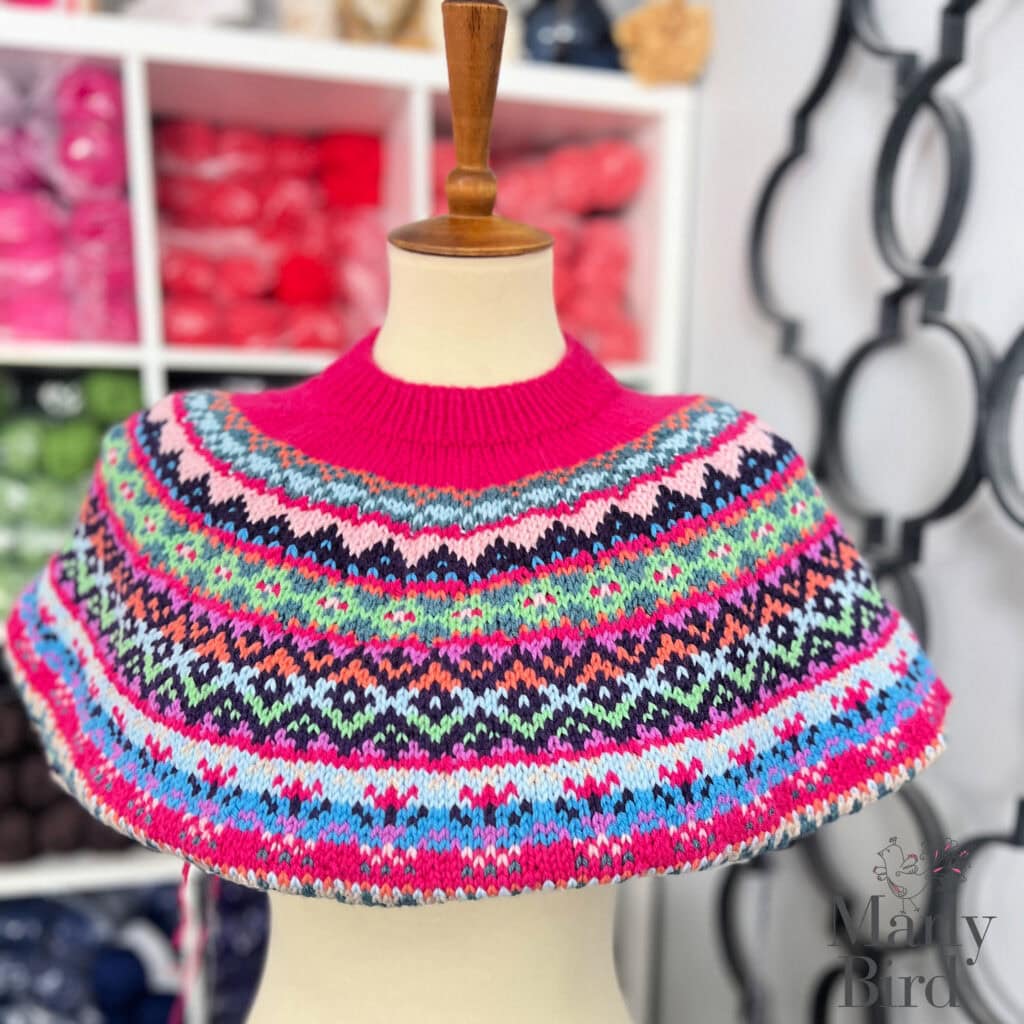
Looking for Part 3? Click Here.
Scroll down to dive into Part 4 and let’s transition from one color stockinette stitches to some fun colorwork. It is like magic! ✨
Prism Path Swoncho
Designed by: Marly Bird
SKILL LEVEL
Intermediate
MEASUREMENTS
To Fit Sizes
Extra-Small/Small/Medium 28-38” [71-96.5 cm] bust
Large/Extra-Large 40-46” [101.5-117 cm] bust
2/3 Extra-Large 48-54” [122-137 cm] bust
4/5 Extra-Large 56-62” [142-157.5 cm] bust
Sample made in size 2 / 3 Extra-Large
Finished Measurements
Bottom Circumference 52½ (59½, 72, 84½)” [133.5 (151, 183, 214.5) cm]
Length 27 (27½, 28, 29)” [68.5 (70, 71, 73.5) cm]
Gauge
18 sts and 24 rounds = 4” [10 cm] in Fair Isle knitting with larger needles.
18 sts and 24 rounds = 4” [10 cm] in Stockinette st with smaller needles.
MATERIALS
Yarn
KnitPicks Swish Worsted (100% Superwash Merino Wool, 110 yds / 100 m, 1.75 oz/ 50 g, CYCA# 4 worsted)
6 (8, 10, 12) balls: Crush (28657) (A)
- 1 ball: Conch (c26068) (B)
- 1 ball: Estuary Heather (c28655) (C)
- 1 ball: Arctic (c28656) (D)
- 1 ball: Frosting (c28658) (E)
- 1 (1, 1, 2) balls: Indigo Heather (c24097) (F)
- 1 ball: Electric Blue (c26645) (G)
- 1 ball: Mint Julep (n4128) (H)
- 1 ball: Lady Slipper (n4127) (I)
- 1 ball: Nutmeg Heather (28652) (J)
Needles
A variety of needle lengths are used to accommodate the number of stitches. Getting interchangeable needle sets is a great option for this project.
- Chiaogoo Shortie Needle Set (US sizes 0-8, up to 14” [35.5 cm] circulars
- Chiaogoo Full Needle Set (US 2-15 [2.75 – 10 mm], with cables to extend up to 40”
- U.S. 8 [5 mm] circular knitting needles, 12” [30.5 cm], 16” [40.5 cm], 24” [61 cm], 32” [81 cm], [47” [119 cm] and 60” [152 cm] long needles;
- U.S. 9 [5.5 mm] circular knitting needles, 24” [61 cm], 32” [81 cm], [47” [119 cm] and 60” [152 cm] long needles, or size required for gauge.
Notions
Removable stitch markers, stitch holders or spare circular needles, tapestry needle.
ABBREVIATIONS
K – Knit
KFB – Knit Front and Back
P – Purl
Pm – Place marker
RS – Right side
slip marker – slip marker
WS – Wrong side
SPECIAL STITCHES
M1 (Make 1): With tip of left needle, pick up the horizontal strand between stitches from front to back. Knit this strand through the back leg, twisting it into a loop in the process – 1 stitch increased.
Kfb (Knit Front & Back): Knit through front and back of next stitch – 1 stitch increased.
Ssk (Slip, Slip, Knit): Slip 2 stitches, one at a time, as if to knit. Insert left hand needle into the front of these two stitches and knit them together from this position (1 stitch decreased)
SPECIAL TECHNIQUES
German Short Rows: Doubling the Stitch
When working German short rows, you’ll often hear the phrase “double the stitch.” This simply means we’re manipulating the working yarn in such a way that the stitch appears to have two strands wrapped over the needle instead of one. This visual cue helps mark your turning point and keeps your short rows looking clean and seamless.
Here’s how to work the turns step-by-step:
💡Turning on the Right Side:
- Knit to the stitch indicated in your pattern.
- Turn your work—now the wrong side is facing.
- With yarn in front, slip 1 stitch purlwise from the left needle to the right needle.
- Pull the yarn over the top of the right needle to the back. This creates the “double stitch” by distorting the slipped stitch.
- Bring the yarn to the front between the needles, ready to work the next purl stitch.
- Work across the row as directed in the pattern, keeping a firm tension for the next few stitches.
.
💡 Turning on the Wrong Side:
- Purl to the stitch indicated in your pattern.
- Turn your work—now the right side is facing.
- Bring the yarn to the front between the needles.
- With yarn in front, slip 1 stitch purlwise from the left needle to the right needle.
- Pull the yarn over the top of the right needle to the back. Again, this distorts the stitch and creates the doubled look.
- Work across the row as directed in the pattern, keeping a firm tension for the next few stitches.
Repeat these steps wherever the pattern indicates a German short row turn. When you come back to those doubled stitches later, you’ll work them as one stitch—treat both loops together as a single stitch to avoid holes.
NOTES
- Directions are for the smallest size; changes for larger sizes are in parentheses. When only one number is given then that number applies to all sizes.
- When working in Fair Isle technique, carry yarn not in use loosely across WS of work but never over more than 5 sts. When it must pass over more than 5 sts, weave it over and under color in use on next st or at center point of the sts it passes over. The colors are never twisted around one another.
- When a color is finished being used in a section, cut it and carry on. Do not carry colors up the inside of work.
- As more stitches are added to needles switch to longer needles to accommodate them.
VIDEO TUTORIALS
- How to do German Short Rows for Back Neck Shaping >> https://youtu.be/rrJUYF_s0T8 <<
- How to do 1×1 ribbing >> https://youtu.be/xx7XFsbEGkE <<
- Long-Tail Cast-On >> https://www.youtube.com/watch?v=vEGwt4cedLM <<
- Knit Stitch (continental style) >> https://www.youtube.com/watch?v=M3brKFKg5Yc <<
- Purl Stitch (continental style) >> https://www.youtube.com/watch?v=LuDt-8jqh4g <<
- How to Add Lifeline >> https://youtu.be/FiqYUE_aHAw <<
- How to Tink >> https://youtu.be/c7Gud7k4Y8k <<
- How to Bury Ends >> https://youtu.be/8_NBGUKjO-E <<
- Fair Isle vid >> https://youtu.be/OaJg_hh1VVw
- How to Add Stitches for Underarm >> https://youtu.be/cRRJ2plYr_U
- Tips for Chart 1 >> https://youtu.be/mBsub805wtA <<
- Tips for Chart 2 >> https://youtu.be/93YktrXiU_Q <<
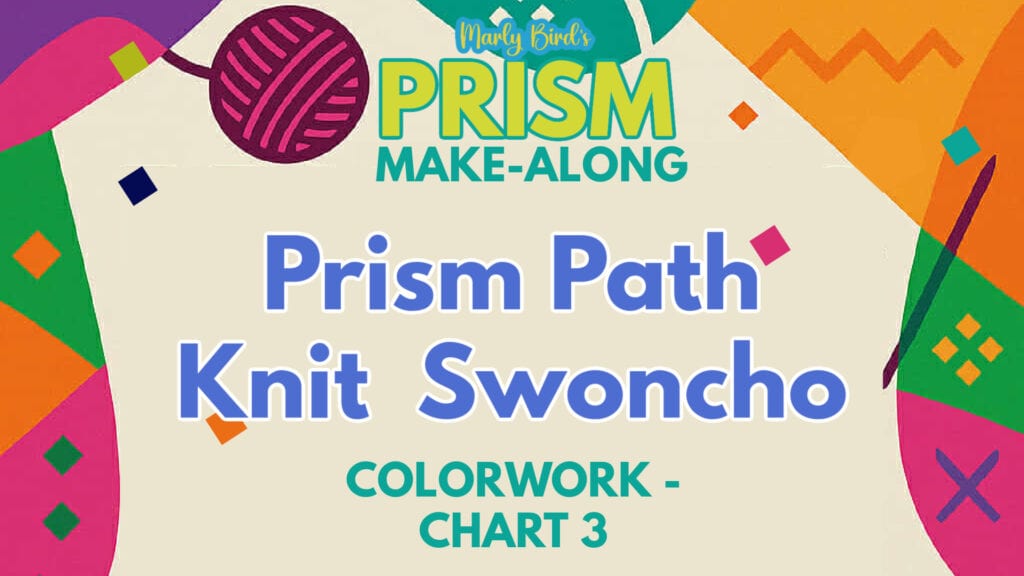
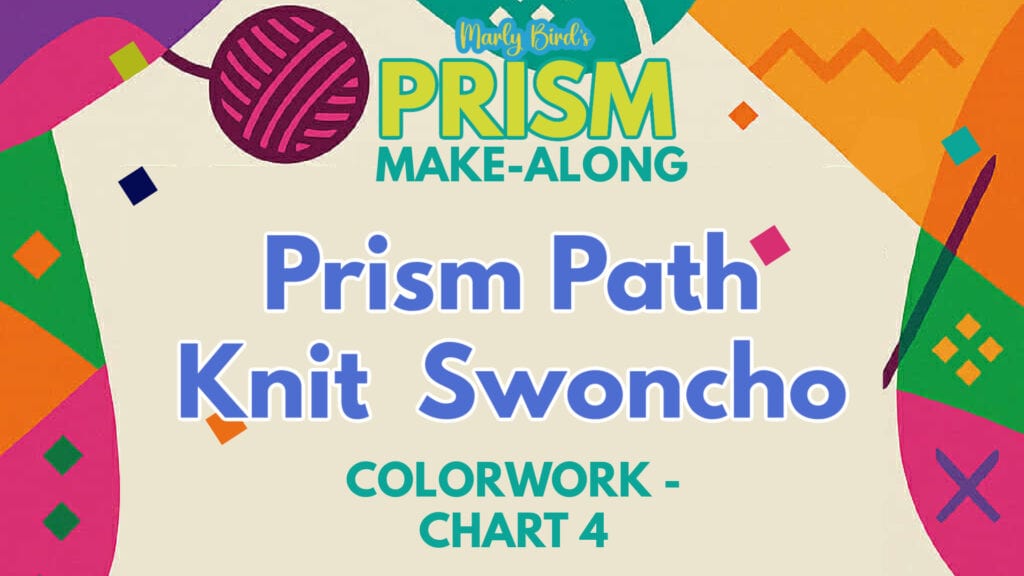
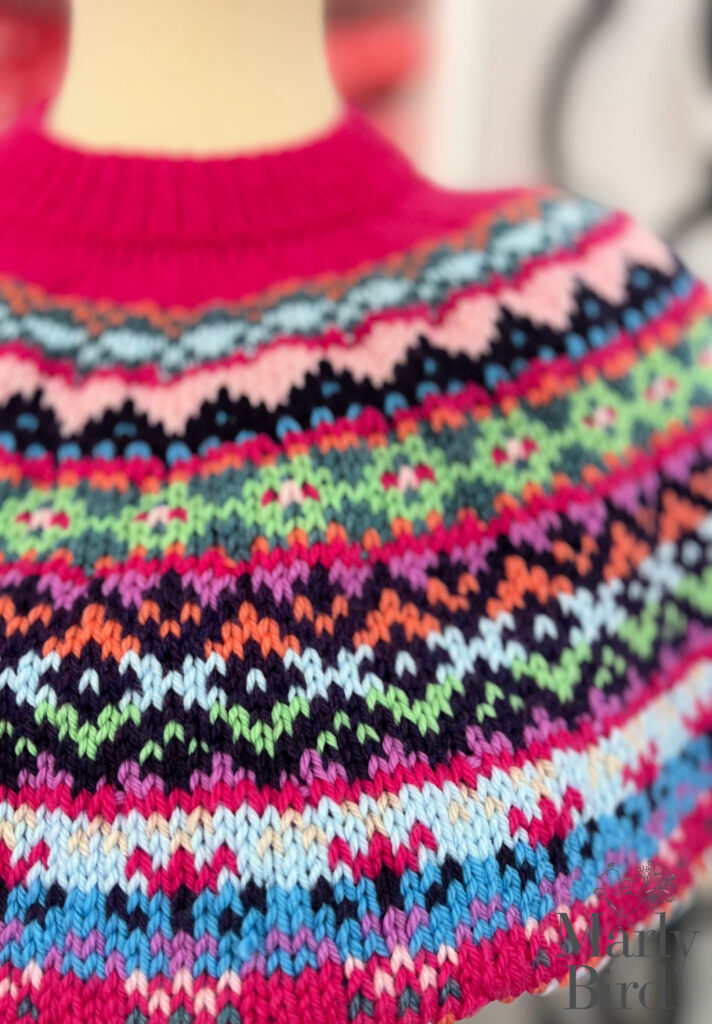
PRISM PATH KNIT SWONCHO PATTERN – PART 4
Chart III
Knit 7 rounds of Chart III, reading rounds from right to left. The 7-st repeat will be worked 26 (28, 32, 36) times around.
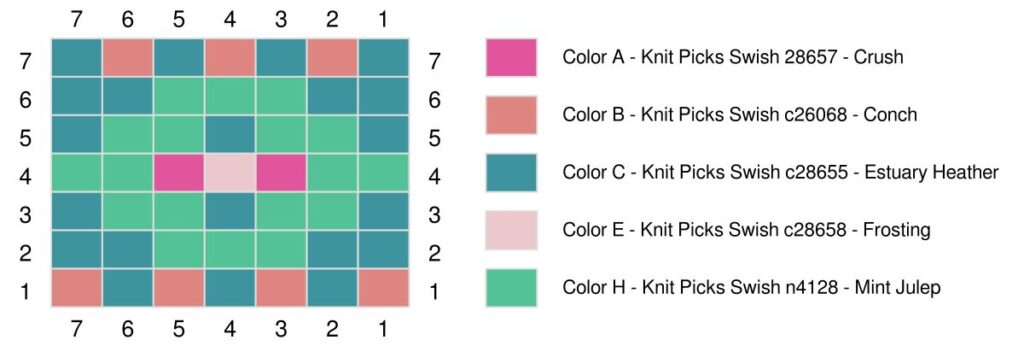
Next round (increase round): With A * k3, kfb, k3; repeat from * around – 208 (224, 256, 288) sts.
Chart IV
Knit 13 rounds of Chart IV, reading rounds from right to left. The 8-st repeat will be worked 26 (28, 32, 36) times around.
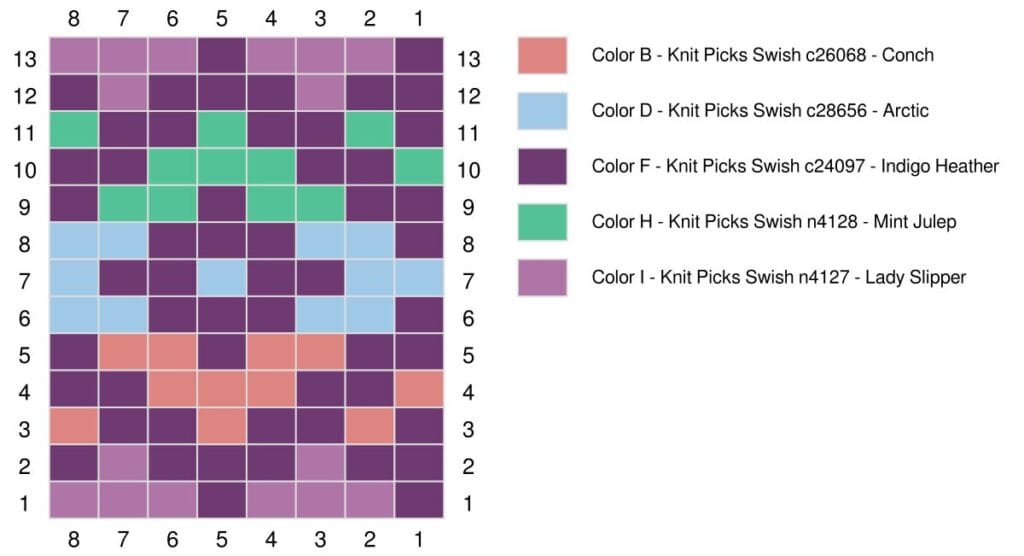
Next round (increase round): With A * k5, kfb, k2; repeat from * around. 234 (252, 288, 324) sts.
🎯 Keep Going!
You’re building something vibrant and wearable—and we’re cheering for every stitch. Don’t forget to:
- Share your photos and progress with #PrismMakeAlong and #MarlyBird
- Join the conversation in the BiCrafty Community on Facebook
- Be kind to your yarn, your hands, and your pace—this is about joy, not perfection!
📅 The next part of the pattern will be released on Thursday, May 15 at 12:00 pm ET—so mark your calendar and keep those needles moving!
Let me know if you’d like a matching email or social posts to go with this release!


